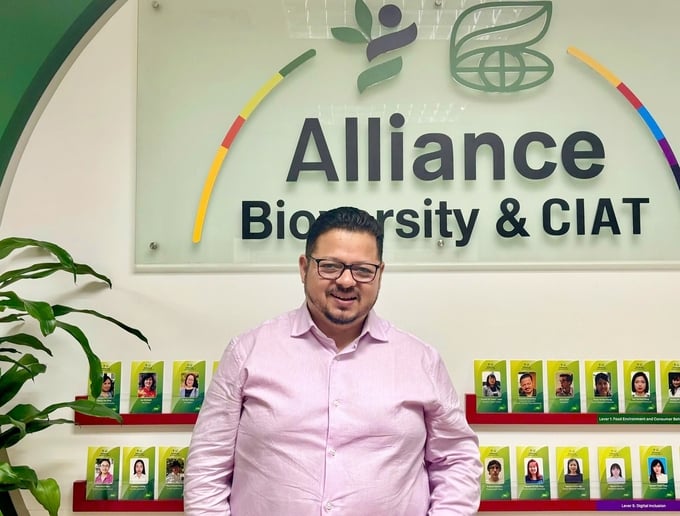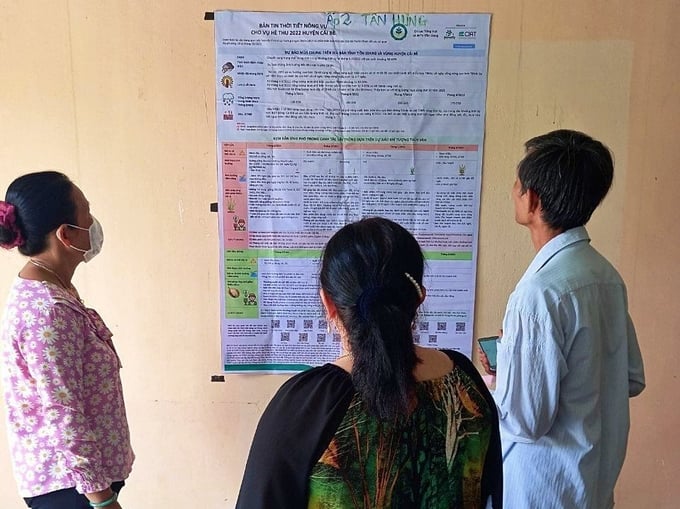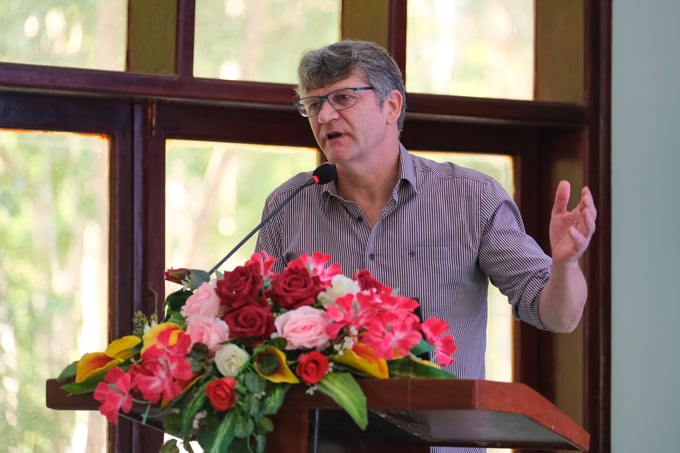November 27, 2025 | 20:57 GMT +7
November 27, 2025 | 20:57 GMT +7
Hotline: 0913.378.918
November 27, 2025 | 20:57 GMT +7
Hotline: 0913.378.918
As an active member of the Partnership Agreement for Transparent, Responsible and Sustainable Food Systems Transformation (FST-Partnership) initiated by the Government of Vietnam, the International Center for Tropical Agriculture (CIAT) plays a key role in establishing a scientific foundation to support national-level policy formulation and in proposing solutions to enhance the sustainability of the food safety system.
In the international agricultural research consortium CGIAR, of which CIAT is a member organization, the interplay between agriculture, environment, and climate change is central to sustainable development initiatives.
Speaking with Vietnam Agriculture Newspaper, PhD. Ricardo Hernandez, CIAT's Country Representative in Vietnam, emphasized that ensuring production and food security is paramount. However, to achieve the long-term goals of the National Action Plan for transparent, responsible, and sustainable agricultural system transformation, it is crucial to simultaneously consider environmental impacts and climate change adaptation capabilities.
Within this framework, he expects the roles of the Ministry of Agriculture and Environment to facilitate comprehensive and effective interdisciplinary integration, thereby creating more opportunities for close collaboration among stakeholders.

PhD. Ricardo Hernandez, Country Representative of the International Center for Tropical Agriculture (CIAT) in Vietnam, hopes for a holistic approach to transforming a sustainable food system. Photo: Kieu Chi.
Partnership Agreement for Transparent, Responsible and Sustainable Food Systems Transformation in Vietnam (FST-Partnership) is a key collaboration involving the Ministry of Agriculture and Rural Development, other relevant ministries, and 45 domestic and international partners. This initiative demonstrates the Vietnamese government's commitment to developing a sustainable agricultural sector that is responsible toward both nature and people.
Aligned with the Vietnamese government's overall direction, CIAT's initiatives center on implementing nature-positive agriculture solutions, projects linking food and forestry, research on biodiversity improvement, and the development of eco-tourism models connected to agriculture.
"The integration of regulatory agencies will create more opportunities for a more holistic approach in the programs we are implementing," said PhD. Ricardo Hernandez. "CIAT is committed to continuing to provide technical support to the Vietnamese government through research based on solid scientific evidence."
PhD. Ricardo Hernandez emphasized the crucial role of the environment, climate change, agriculture, and nutrition in advancing the long-term goal of promoting sustainable agricultural development and environmental protection in Vietnam. "We need to understand that climate change not only affects crops but also influences consumer trends and shapes the future of urbanization," he stated.
The agro-climatic bulletin (ACB) is a service developed by CIAT for farmers in the Mekong Delta to help rice growers implement effective farming practices. This climate service offers seasonal and monthly predictions and short-term forecasts for 10 days, enabling farmers to proactively assess climate risks and take mitigation measures.
Technical Working Groups (TWGs) of government and other local partners at provincial and district level provide guidance to farmers with support of CIAT. Leveraging their expertise in agriculture and based on climate and weather forecasts, these TWGs provide advisory on optimal planting times for different crops, early-season risk warnings, salinity intrusion updates, and crop management to help minimize impacts of climate change and adverse weather conditions.
Mr. Kees Swaans, Alliance's Regional Lead of Climate Action in Asia, stated that over the past five years, CIAT has collaborated with the Southern Regional Hydro-Meteorological Center and the Department of Crop Production and its provincial partners to ensure the delivery of accurate climate services to farmers at the district level. By mid-2024, agricultural bulletins were issued to more than 500 communes in 70 districts, reaching 270,000 farmers through diverse media of which 50,000 directly through Zalo groups.

The information in the seasonal agro-climatic bulletin clearly presents agroclimatic advisories per cropping stage based on hydrometeorological reports for key crops. Photo: CIAT.
Additionally, CIAT collaborates with the Department of Crop Production to provide climate advisory services while also considering adjustments to suitable approaches within the One Million Hectares High-Quality and Low-Emission Rice Program.
"Climate advisory for agricultural activities is a key intersection between agriculture and the environment," said Mr. Kees Swaans. "A unified data source can help link climate forecasts with agricultural production, supporting crop management and sustainable farming practices."
He emphasized the importance of improving data accessibility and sharing, making climate forecasts more easily usable for strategic decision-making in the agricultural sector. This would facilitate and maximize the benefits of agricultural data digitalization.
Accordingly, Vietnam needs to strengthen cross-sector collaboration to enhance data connectivity for useful services that benefit farmers. CIAT’s Country Representative in Vietnam sees great potential for deeper cooperation, as CGIAR and Vietnam’s ministries and sectors are moving toward closer collaboration.
In the intersection between agriculture and the environment, PhD. Ricardo Hernandez sees a significant opportunity to contribute to the National Action Plan for Food Systems Transformation by 2030.
As part of the national plan, CIAT is also committed to promoting sustainable agricultural practices, reducing emissions, and minimizing the environmental impact of agricultural production.
According to Mr. Kees Swaans, the organization likes to support the One Million Hectares Rice Program in efforts to reduce the use of pesticides and chemical fertilizers. "We look forward to the opportunities that will arise by linking agriculture and the environment more strongly" he said,. He emphasized the importance of achieving a balance between agricultural development and environmental protection.

Mr. Kees Swaans, Alliance's Regional Lead of Climate Action in Asia, proposes a comprehensive plan to achieve a balance between agricultural development and environmental protection. Photo: CIAT.
"We look forward to the opportunities that will arise from this new holistic approach between agriculture and the environment," he said, suggesting the need for a comprehensive plan to designate areas for agriculture and conservation. He emphasized the importance of achieving a balance between agricultural development and environmental protection, especially in key regions such as the Mekong Delta.
According to the CIAT Country Representative in Vietnam, CIAT places a strong emphasis on integrating scientific research into practical policy contexts. Sustainable transformation in the food system does not rely solely on pilot programs but requires proactive and focused government policies to scale up and implement solutions nationwide.
To bring about real change in people's daily lives, PhD. Ricardo Hernandez highlighted that the role of focused governmental policies is of utmost importance.
CIAT, together with CGIAR, is willing to support Vietnam in analyzing and assessing existing policies to ensure their feasibility in implementation. The integration of science, policy, and practical production will serve as the foundation for Vietnam to move towards a sustainable and climate-resilient agricultural sector.
Translated by Kieu Chi

(VAN) On November 27, in the meeting with Minister Tran Duc Thang, Mayor Yin Yong shared Beijing’s experience to improve environment and air quality.

(VAN) After 30 years, both sides identified strategic areas of cooperation: sustainable production, increasing coffee value and training for farmers.
/2025/11/27/4910-4-164708_294.jpg)
(VAN) On the afternoon of November 27 in Beijing, Minister of Agriculture and Environment Tran Duc Thang held a working session with several major Chinese enterprises operating in the agriculture and environment sector.

(VAN) The Department of Animal Health issued a provisional guideline requesting local authorities to increase surveillance, collect samples for testing, and conduct epidemiological investigations according to the established procedure.

(VAN) The United Nations recommends that Vietnam utilize data and artificial intelligence to enhance early disaster warnings and reduce GDP losses by 3.2% in the context of climate change.

(VAN) On the morning of November 27 in Beijing, Minister Tran Duc Thang and the Deputy Commissioner General of the General Administration of Customs of China signed a protocol on fresh jackfruit exports.

(VAN) As floodwaters recede, a vast network of irrigation works across eastern Gia Lai is emerging in a state of severe disrepair, with extensive damage demanding urgent restoration ahead of the 2025-2026 winter-spring cropping season.